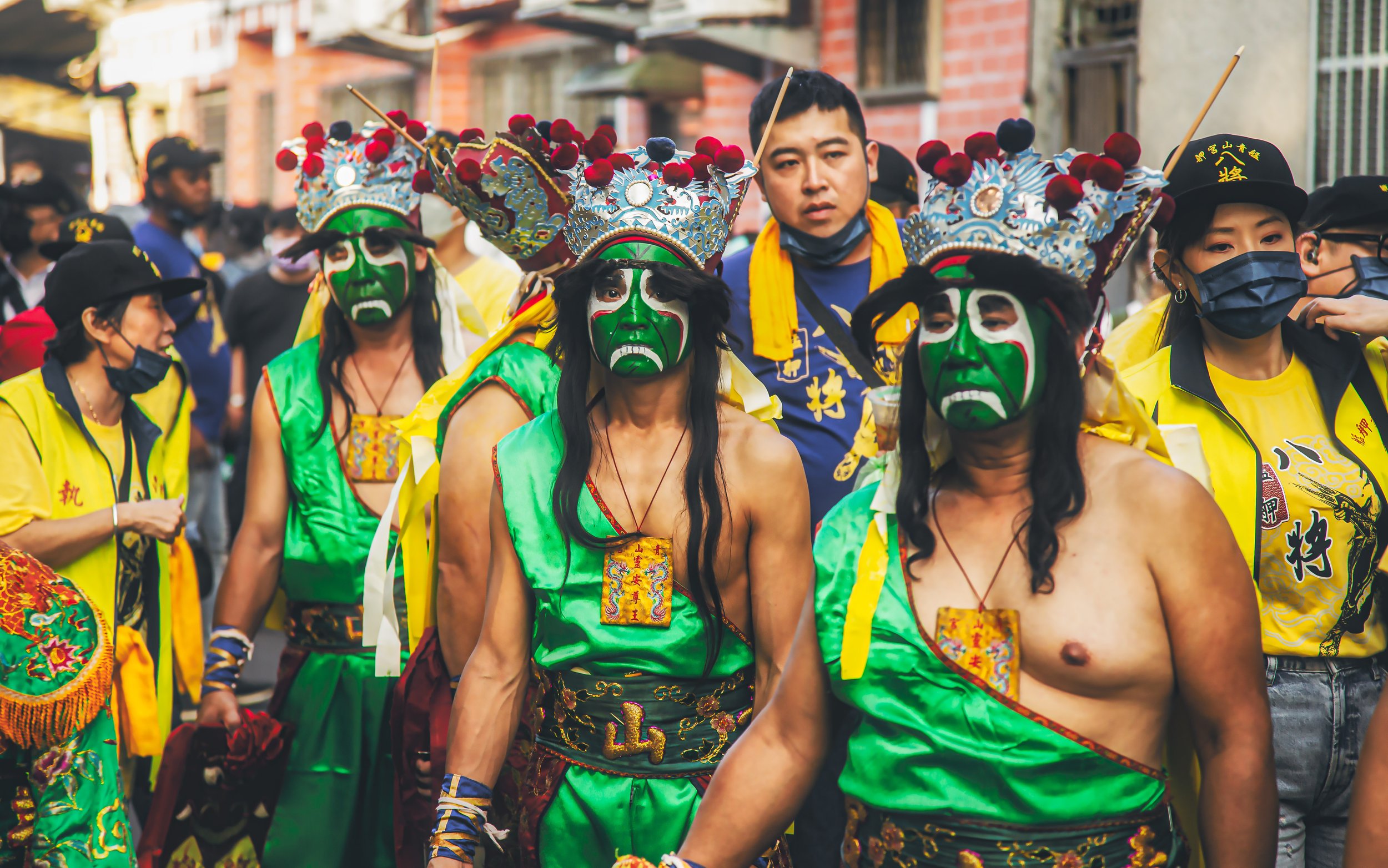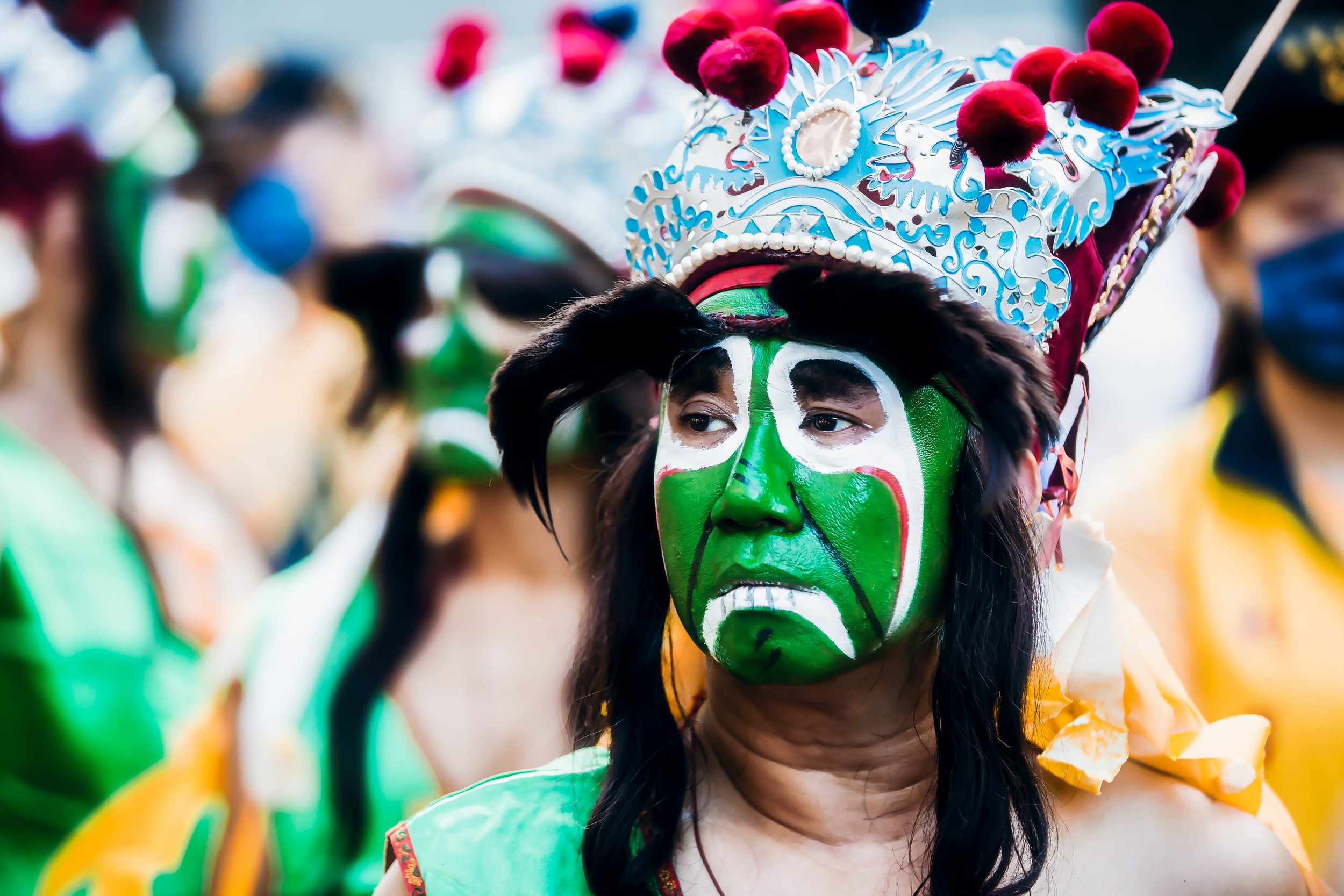The annual Qingshan King Festival (青山靈安尊王), one of Taipei’s most important religious and cultural attractions, successfully wrapped up for another year in early November, and once again I was there for most of the day taking photos with both my digital and film cameras.
The festival, which seems to get bigger and better every year continues to cement its position as one of the most important religious festivities on the nation’s calendar of events, and once again attracted large crowds of people, helping to keep both old and new traditions alive.
The revival of the festival over the past decade, and the popularity it currently enjoys (especially with regard to attracting the youth of Taiwan to come out and enjoy this cultural experience) is an amazing success story, and not only has it helped garner more interest in the cultural, historic and religious history of the district, it has also helped show that Bangka can be a pretty cool place to live.
One of the reasons for the surge in youth interest in the festival (and the district itself) is in large part thanks to Bangkha’s rockstar legislator, Freddy Lim (林昶佐), who has worked tirelessly to promote the festival with events that have brought young people back to the district to celebrate its history.
Bangkha has suffered for decades due to its aging population and for it’s reputation for having a seedy environment and the decline in the district has been a problem for the local government for quite some time. In recent years however, the youth of Bangka have started to come back and investing in their neighborhood - opening up hip new restaurants, cafes, and bars, which in turn is helping to bring the district back to life after years of neglect.
Link: TokyoBike Taipei Cafe
Helping in his capacity as the district’s legislator, Freddy has helped to promote the Qingshan King Festival on an official level ensuring that government funding and support is available for these events.
For most politicians, that would be where their support comes to an end, but Freddy has gone back to his roots as the frontman of the black metal band Chthonic (閃靈) and helped to organize the Roar Now Bangkah (萬華大鬧熱) indie music festival, which lasts for about a week leading up to the Qingshan King Festival, bringing youth from all over Taiwan to the district.
Link: Celebrating a God’s Birthday with a Temple Rave (No Man is an Island)
If you weren’t already aware, the Qingshan King Festival, falls on the days between October 20-22 (on the Lunar Calendar) and is essentially an event where a Taiwanese folk-religion deity, known as the “Qingshan King” (青山王) comes out of his temple to inspect the neighborhood he calls home.
Coincidentally, it’s also a celebration of the his birthday!
Filling a role similar to that of the City God (城隍爺), the Qingshan King and his entourage parade through the streets of Bangka, inspecting homes and businesses, banishing evil spirits and bringing good luck to the locals.
As the sworn protector of Bangka, part of his role is to visit all of the places of worship within his territory to say hello, and every temple in town makes sure to prepare for his arrival. While some might wonder why a god from a deity the size of Qingshan Temple (青山宮) is so important, especially when it has neighbors such as Longshan Temple (艋舺龍山寺) and Qingshui Temple (艋舺清水巖), the historic and cultural importance taking place here is something that cannot be understated.
All of this activity makes for a pretty lively event with loud music, fire crackers, fire works, and thousands of people parading through the streets, bringing traffic to a standstill. While this might all sound like a great time, not every resident of the district appreciates all of the noise created by the several day-long festival. So as the festival has grown in popularity, officials have had to come up with ways to streamline the event and reduce the impact it has on the general public - and it seems that some of these efforts have been working as 78% of people polled in 2021 were satisfied with the steps that were taken to improve the festival.
Nevertheless, the event tends to be a loud one, so if you plan on attending in the future, a good pair of earplugs might be a good investment.
Being that I’ve written about this event on a few occasions, my plan is to keep this one short - Today I’m just here to share some of my photos of the event, which I’ll split up between my digital photos and my film shots.
Over the years, I’ve taken part in this festival on several occasions and have more or less figured out how to navigate the massive crowds with ease. This year, I spent all of my time following Qingshan Temple’s Eight Generals Troupe (艋舺青山宮八將團) on their procession through the city.
As part of an ongoing project of mine, I’m a bit more keen to follow them around than the rest of the parade, which I’ve seen in years past.
To briefly explain, the “Eight Generals” (八家將) are literally translated into English as the ‘Eight Home Generals’ and at Qingshan Temple, the group consists of eight officers and one young boy (引路童子), who serves as their guide through the streets of Bangka.
Each of the generals carries an ancient weapon used for torture, and they are meant to appear quite menacing as they are gods of the underworld who have evolved over the century to act as spiritual bodyguards for important deities such as the City God (城隍爺), Mazu (媽祖), Wangye (王爺) and the Qingshan King (青山王) or any deity who has a role in managing our world and the underworld, which corresponds to the theory of yin (陰) and yang (陽).
Every one of the generals is tasked with performing a specific role, which can be likened to supernatural policeman for both the living and the dead. Some of them are in charge of investigating and catching evil spirits (lock generals) while others are in charge of judging them and dealing out punishment (cangue generals) to whatever evil supernatural forces might be lurking in the district.
Their primary duty during the Qingshan King Festival is to clear the area of evil spirits as they make their way through the streets of Bangka in preparation for the arrival of their master. Their job is a serious one, so you are unlikely to see them smile (they do from time to time).
The number of generals that appear in these groups tends to vary, but at Qingshan Temple, you’ll find four generals with green faces (lock generals) and another four with red faces (cangue generals). For reference, the names of the generals who form the front of the line are General Gan (甘爺), General Liu (柳爺), General Xie (謝爺) and General Fan (范爺). The four in that make up the rear are named after the seasons, the General of Spring (春大神), the General of Summer (夏大神), the General of Autumn (秋大神) and the General of Winter (冬大神).
Link: Ba Jia Jiang (八家將), the Generals (Gods of Taiwan)
If you find all of this as fascinating as I do and would like to learn more about the festival, I recommend reading the other articles I’ve written about the festival in the past so you can get a better idea of what’s going on.
Qingshan King Festival: Part One | Part Two | Part Three


















